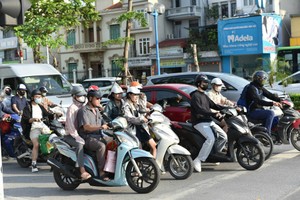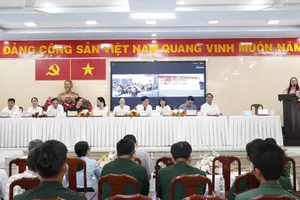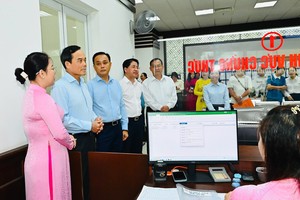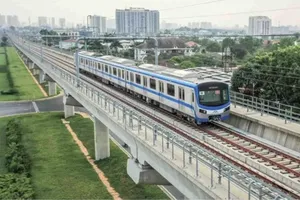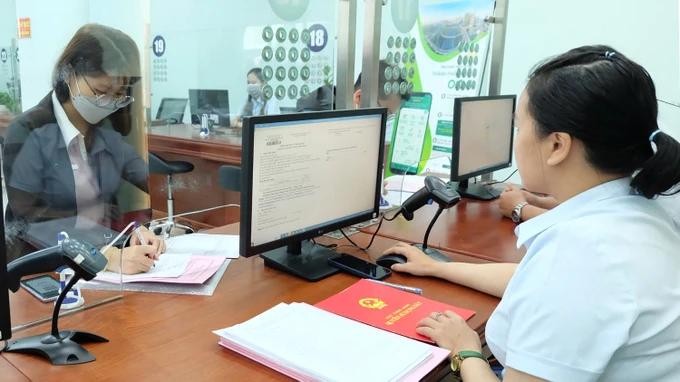
This goal exceeds the national average by 5 percent to 10 percent, reflecting both the city's ambitious vision and the challenges it faces in advancing its digital economy.
Cashless payments have become a common practice for the majority of residents in Ho Chi Minh City. QR codes and account numbers are conveniently pre-printed and prominently displayed at various street vendors and market stalls. Upon making a purchase, customers simply use their phones to scan the QR code, facilitating instantaneous transfer of funds to the seller's account.
Street vendor Pham Thi Bich Han, who sells sticky rice and sweet soup at Phuoc Binh market in Thu Duc City, revealed that fellow traders in the market are well-versed in conducting online transactions and receiving payments through bank transfers. For example, she sells 50-70 portions of sticky rice and sweet soup daily at an average price of VND10,000 per portion, cash payments typically amount to only around VND100,000-VND200,000 while the remainder is typically settled through bank transfers.
In addition to the rise of cashless payments, e-commerce activities are gaining momentum. Traders in traditional markets and import-export enterprises all have been engaging in fierce competition to showcase their products on various trading platforms. A recent notable event was the live stream initiative ‘Super live Vietnamese goods’ on TikTok, which featured over 200 specialty products and OCOP items from 45 provinces and cities from September 26 to September 29, leaving a lasting impact.
In a similar vein, towards the end of 2023, the Thu Duc City People's Committee hosted the Thu Duc online market, drawing the participation of 50 retailers.
Through cross-border livestream sales sessions, Director Nguyen Ngoc Luan of Global Trade Link Company and founder of the Meet More coffee brand has played a key role in introducing Vietnamese agricultural products to the global market. According to Director Luan, the digital economy is booming, and every business must adapt its marketing strategies to reach customers effectively. Currently, e-commerce is a prevailing trend that businesses must embrace to stay competitive and avoid being left behind.
The contribution of the digital economy to Ho Chi Minh City's Gross Regional Domestic Product (GRDP) has shown a consistent upward trend over recent years. As reported by the Ministry of Information and Communications, the digital economy's estimated contribution to the city's GRDP is projected to be 18.66 percent in 2022 and 21.5 percent in 2023.
Notably, the software industry in the city generated revenue of VND64,110 billion, making it the leading sector in the nation; the hardware industry followed with VND92,556 billion, while IT services contributed VND23,100 billion, securing the second position nationally.
With awareness of digital transformation in enhancing production and business operations, General Director Le Mai Huu Lam of Cat Van Loi Industrial Electrical Equipment Manufacturing Company in Go Vap District has engaged in a six-month training program focused on digital transformation for businesses. According to General Director Lam, effective digital transformation begins with business leaders and directors acquiring the necessary knowledge and skills to implement these changes in their daily operations.
Mr. Lam said that, along with the efforts of businesses themselves, the Ho Chi Minh City government has had specific solutions to support businesses, especially small and medium enterprises in digital transformation.
Ho Chi Minh City is home to many large information technology enterprises in the country with 22,773 enterprises which were allowed to operate in 2023. Some 85,214 people are working in this industry. The southern metropolis is also home to Vietnam's pioneering large IT park, Quang Trung Software Park, sprawling across 43 hectares. In 2023, the park generated impressive revenue, amounting to VND12,720 billion.
The city has attracted many large technology corporations, the largest software programming enterprises in Vietnam with a scale of more than 1,000 employees, playing a leading role in the IT industry in the digital transformation process and developing smart cities.
In the implementation plan for the Project ‘Developing Digital Economy, Sharing Economy, and Circular Economy in Ho Chi Minh City from 2020-2025 with a vision to 2030’ for the 2024-2025 period, the municipal People's Committee has identified four key pillars to promote digital economy development comprising the information technology industry, digitization of economic sectors, digital management, and digital data. The plan also focuses on creating a favorable business environment for digital technology enterprises and addressing challenges that arise in the digital economy development process.
Director Lam Dinh Thang of the Ho Chi Minh City Department of Information and Communications announced that in the upcoming months, the city will focus on expanding initiatives to assist small and medium enterprises, as well as wholesalers and retailers, in their digital transformation efforts.
The department will collaborate with the Ministry of Information and Communications to significantly enhance e-commerce development and advance the digital transformation of key sectors, including high-tech industries, the seaport sector, food processing, textiles, and smart tourism.
Notably, the Department of Information and Communications will advocate for the establishment of more concentrated information technology zones, accompanied by attractive policies to draw in investors, and will work towards the construction of additional data centers to foster the growth of the digital economy in the coming time.
